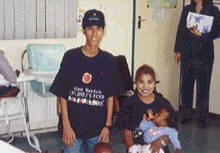 |


|
|
Getting Things Done |
| By John S. James AIDS Treatment News
The world has more than enough resources to deal with HIV/AIDS (and also tuberculosis, malaria, and other infectious diseases); and there are millions of people who care and can help. The big shortage is of attractive, workable opportunities for channeling this concern into effective action. For example, we heard from one U.S. HIV physician that he wanted to donate his vacations for several years to go to Africa or wherever he was needed, to train doctors in diagnosing and treating HIV disease. But he could find no program that had set up arrangements for doing so. (Some U.S. HIV doctors and researchers already work in Africa, but usually full time; we also need opportunities for doctors who want to maintain their current practice but could donate vacations, or work during other special occasions.) For a different example, consider the great change in the worldwide discussion of treatment access and prices of medicines. Three years ago, almost everyone took antiretroviral prices of about $10,000 per patient per year, even in the poorest countries, for granted -- along with the death without treatment of almost everyone with HIV in Africa and other poor regions. The change could not have happened without the work of a fairly small number of activists around the world -- in ACT UP in the U.S. and France, Treatment Action Committee in South Africa, the Health GAP Coalition in the U.S., and other organizations. How did workable opportunities for involvement in this activism come into being? We do not know.
And of course almost all countries need lots of work in generating public pressure so that governments will have the political will for serious commitment in AIDS and other infectious diseases, and will develop the large-scale programs that require governments involvement. We greatly need the work of determined activists, volunteer or professional, with "people" skills or organizing skills, as well as those with medical or other technical training and experience. But this need does not automatically translate into workable roles that people can choose for themselves. Clearly we already have the need, the resources, and the people willing to help with AIDS and other infectious diseases. The big challenge is how to develop the human structures so that the resources get used and the work gets done. [Note: This writer has a personal Web site, http://www.communicationpractices.org, to explore the development of self-education practices for improving human relationships. We believe this work can contribute to the conscious development of social roles, helping to improve institutions as well.] AIDS Treatment News Published twice monthly Subscription and Editorial Office: 1233 Locust St., 5th floor Philadelphia, PA 19107 800/TREAT-1-2 toll-free email: aidsnews@critpath.org useful links: http://www.aidsnews.org/ Editor and Publisher: John S. James Associate Editor: Tadd T. Tobias Statement of Purpose: AIDS Treatment News reports on experimental and standard treatments, especially those available now. We interview physicians, scientists, other health professionals, and persons with AIDS or HIV; we also collect information from meetings and conferences, medical journals, and computer databases. Long-term survivors have usually tried many different treatments, and found combinations that work for them. AIDS Treatment News does not recommend particular therapies, but seeks to increase the options available. AIDS Treatment News is published 24 times per year, on the first and third Friday of every month, and print copies are sent by first class mail. Email is available (see below). Back issues are available at http://www.aidsnews.org/ To subscribe, you can call 800-TREAT-1-2 or 415-255-0588: |

© 1997-2002 BEI
 Volunteers with Nelson Mandela's South African AIDS services organization doing their part to combat the global epidemic
Volunteers with Nelson Mandela's South African AIDS services organization doing their part to combat the global epidemic